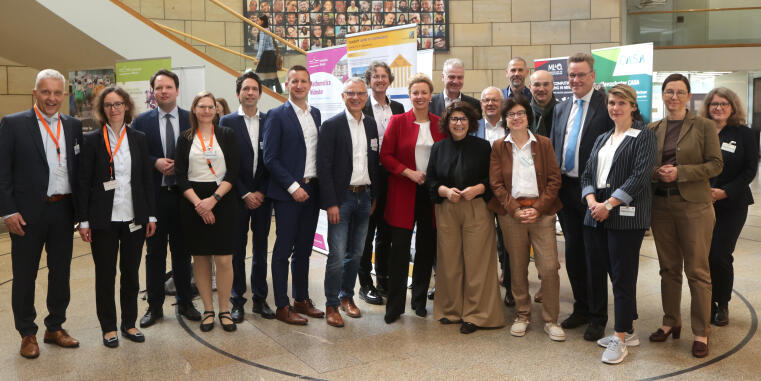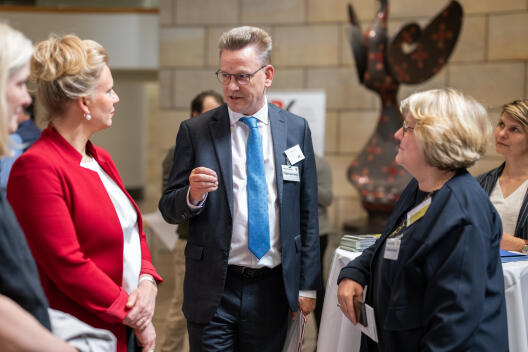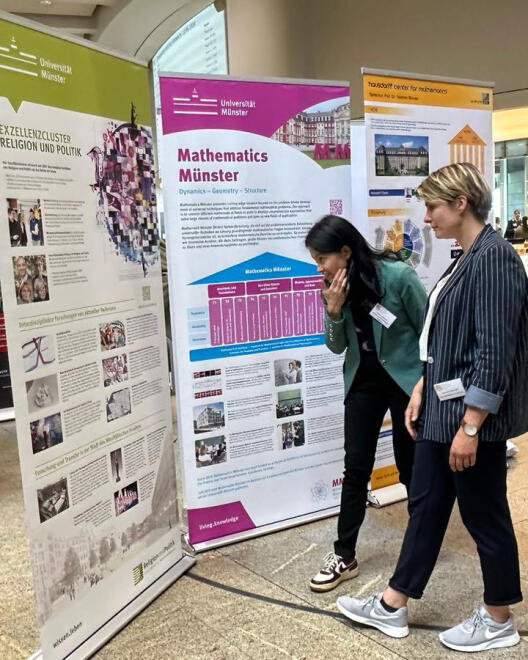
Cluster of Excellence presents its work in Düsseldorf state parliament
Members of parliament and researchers discuss current research – Parliamentary breakfast and exhibition on the 14 Clusters of Excellence in North Rhine-Westphalia – Science minister Ina Brandes commends excellent research

The 14 Clusters of Excellence at universities in North Rhine-Westphalia had the opportunity at a parliamentary breakfast and exhibition held in the state parliament in Düsseldorf to present their work to politicians and the general public. The rectors and speakers of the 14 Clusters of Excellence informed members of parliament from various parties, as well as representatives of state ministries, of current work being carried out by the research networks.
During her tour of the exhibition, North Rhine-Westphalia science minister Ina Brandes stressed that “research and teaching in North Rhine-Westphalia are at Champions League level, and the state government is doing all it can to support the science location”. She also learnt about the work of the two Clusters of Excellence at the University of Münster. There are currently 14 Clusters of Excellence at universities in North Rhine-Westphalia, more than in any other federal state, and these are being provided with funding of between three and ten million euros per year.
Chair of the State Rectors’ Conference (LRK) and rector of the University of Münster, Johannes Wessels, said that the Clusters of Excellence showed the high level of research in Germany’s most populous federal state. “The work of the researchers is of great importance to all of us, as they deal with the major social challenges of our time, such as issues relating to our health and cyber security”. Discussions with politicians, he said, is important in order to find solutions to pressing problems together. As hosts, state parliament vice-president Berivan Aymaz and LRK chair Wessels welcomed the guests at the start of the parliamentary breakfast.
Following the breakfast, Michael Seewald, speaker of the Cluster of Excellence “Religion and Politics”, and Mario Ohlberger, speaker of the Cluster of Excellence “Mathematics Münster”, also talked with politicians, members of the state parliament and ministry representatives, as well as visitors to the parliament. The Clusters of Excellence ran information stands in the civic hall of the Düsseldorf state parliament – something special, since exhibitions are usually not held in the large hall overlooking the Rhine.

The exhibition saw the Cluster of Excellence “Religion and Politics” present its many years of research into the complex relationship between religion and politics across different eras and cultures. With more than 150 researchers from 25 disciplines in the humanities and social sciences, it is the largest research network of its kind in Germany and the only Cluster of Excellence that deals with the theme of religion. The Cluster will receive 31 million euros in funding between 2019 and 2025.
Researchers at the Cluster of Excellence examine conflicts surrounding identity and belonging – such as racism and antisemitism. They analyze the digitalization of religion, new ideological movements on the internet, and the relationship between tradition and innovation in religions. They also explore how societies use legal and political means to regulate conflicts over religious rights and practices. (upm/vvm)

